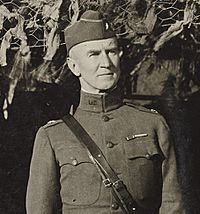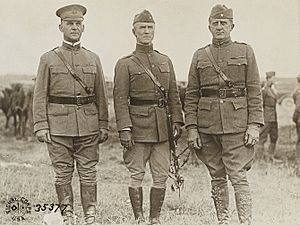Frank Parker (United States Army officer) facts for kids
Quick facts for kids
Frank Parker
|
|
|---|---|

Parker in October 1918, while still a brigadier general.
|
|
| Born | September 21, 1872 Georgetown County, South Carolina, US |
| Died | March 13, 1947 (aged 74) Chicago, Illinois, US |
| Buried |
Mansfield Cemetery, Mansfield, Ohio
|
| Allegiance | United States |
| Service/ |
United States Army |
| Years of service | 1894–1936 |
| Rank | Major General |
| Service number | 0-440 |
| Commands held | Third Army Eighth Corps Area 1st Division Philippine Department Sixth Corps Area |
| Battles/wars | Spanish–American War World War I |
| Awards | Army Distinguished Service Medal Silver Star Citation (2) |
| Spouse(s) | Katherine Hamilton Lahm |
Frank Parker (September 21, 1872 – March 13, 1947) was a brave United States Army officer. He served in the military for over 40 years. His career included fighting in the Spanish–American War and World War I.
During World War I, he showed great leadership. He commanded different groups of soldiers, from a regiment to a whole division. He earned many awards for his courage. These included the Army Distinguished Service Medal and two Silver Star Citations. He also received many awards from other countries.
Contents
Early Life and Education
Frank Parker was born on September 21, 1872. His birthplace was Georgetown County, South Carolina. He came from a family with a long history in the United States. His ancestors included important figures like John Parker and Thomas Heyward.
Parker attended the University of South Carolina. Later, he went to the United States Military Academy. He graduated from West Point in 1894.
Early Military Service
After graduating, Parker served in the Spanish–American War in 1898. He also served in Puerto Rico from 1899 to 1900. From 1900 to 1903, he taught at the United States Military Academy.
In 1904, Parker studied at the Cavalry School in Saumur, France. He then worked as a military attaché in several countries. These included Caracas, Venezuela (1904–1905), Buenos Aires, Argentina (1905–1906), and Cuba (1906–1908). He helped organize cavalry training in Cuba from 1909 to 1912. In 1912, Parker attended the École Supérieure de Guerre in France.
Service in World War I

Parker returned to the École Supérieure de Guerre from 1914 to 1915. He observed French armies in the field from 1916 to 1917. Later, he became the chief of the American Military Mission at the French General Headquarters.
When the United States joined World War I in 1917, Parker was promoted. He became a brigadier general. He commanded the 18th Infantry and the 1st Infantry Brigade. In October 1918, he was appointed commander of the 1st Division, American Expeditionary Force.
After the War
After World War I ended, General John J. Pershing suggested Parker be promoted. However, the Armistice stopped all promotions for generals.
In 1920, Parker graduated from the École Supérieure de Guerre in France again. He stayed there as a professor. He also studied at the Centre des Hautes Études from 1920 to 1921. He continued his education at various military schools in the U.S. He taught at the Command and Staff School in Fort Leavenworth in 1922. From 1923 to 1924, he was a student and instructor at the Army War College. From 1925 to 1927, he commanded a brigade of the 1st Division.
Later Commands and Awards
In 1927, Parker received an honorary degree from the University of South Carolina. He served as Assistant Chief of Staff from 1927 to 1929. He also commanded the Sixth Corps Area. He was promoted to major general in 1929.
From 1932 to 1933, he led the Philippine Department. In 1933, he received another degree from Michigan State College. He was honored with the Order of the Crown of Italy. This award was for his help with the transatlantic flight of Italo Balbo.
From 1933 to 1935, Parker commanded the 1st Division. In February 1936, he took command of the Eighth Corps Area. He then commanded the Third Army from March to September 1936.
Retirement and Legacy
Frank Parker retired from the military on September 30, 1936. He then made his home in Chicago. During World War II, he served as the Executive Director of the Illinois War Council.
Parker passed away on March 13, 1947, in Chicago, Illinois. He was buried at Mansfield City Cemetery in Mansfield, Ohio. He was married to Katherine Hamilton Lahm.
 | Jackie Robinson |
 | Jack Johnson |
 | Althea Gibson |
 | Arthur Ashe |
 | Muhammad Ali |

